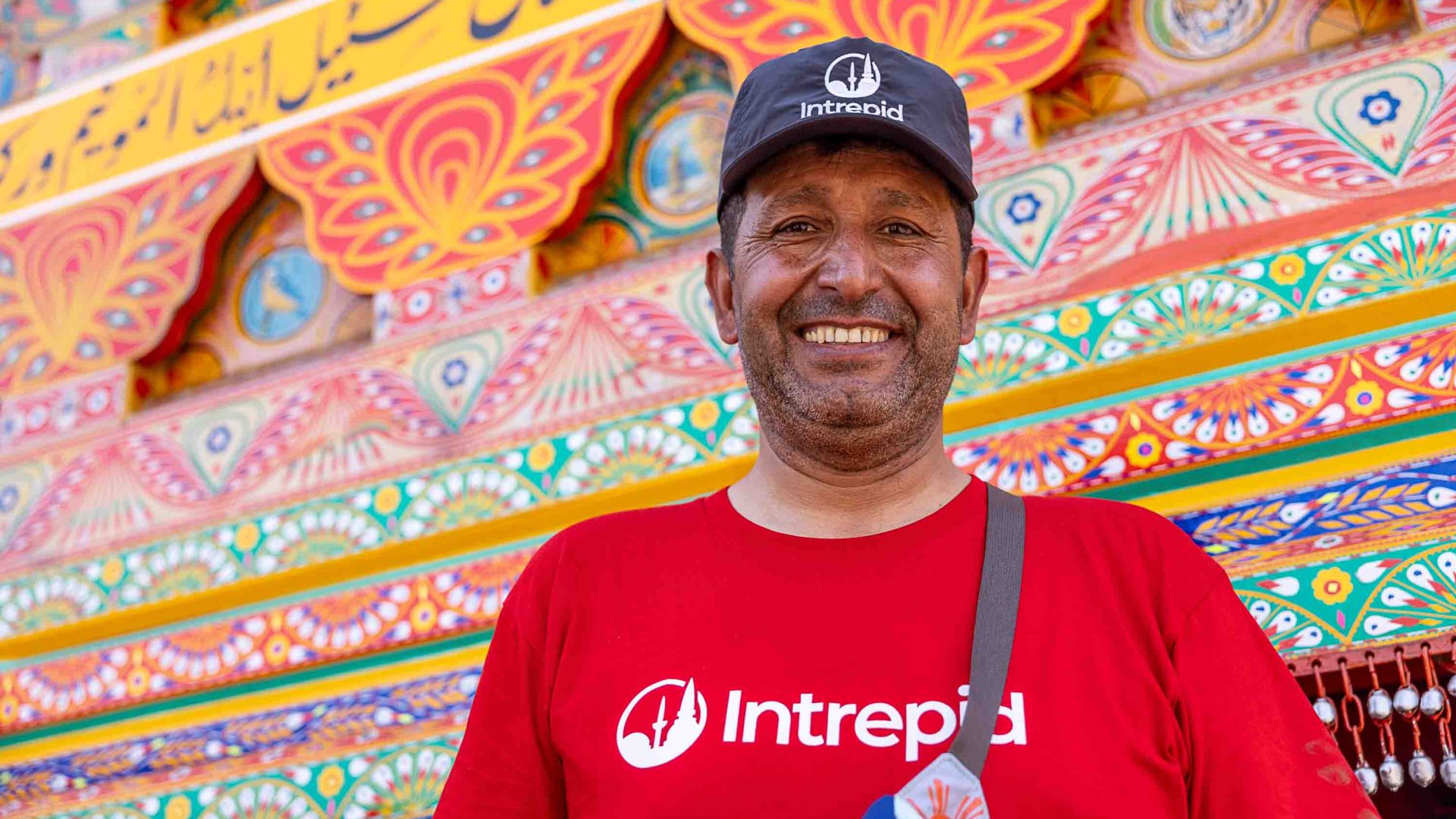
The guide can make or break an organized tour. And for Intrepid’s first ever Pakistan trekking guide Muneer Alam, this is a responsibility he shoulders with joy.


The guide can make or break an organized tour. And for Intrepid’s first ever Pakistan trekking guide Muneer Alam, this is a responsibility he shoulders with joy.
Editors’ note: This trip was operated by Intrepid Travel, parent company of Adventure.com. However, this is an editorial feature commission, and not reviewed externally.
I spot his scarlet red t-shirt and cap first. But even from a distance, I can already see Muneer Alam’s huge, white smile at the other end of the arrivals hall at Islamabad Airport. And for the entirety of the week I spend exploring Pakistan with Muneer, that smile never slips. Not even when one of our trekkers accidentally vomits on his tent.
With five languages including English and an MBA under his belt, Muneer could have chosen any number of career paths. But the 48-year-old married father of three had dreamed of becoming a guide since he was a boy growing up in the Lower Hunza region of Gilgit-Baltistan in Pakistan’s remote, mountainous north.
“One of my cousins was working as a guide, and I wanted to be like him,” Muneer tells me during our Trek Pakistan’s Karakoram Mountains tour, which takes us from the sultry streets of Pakistan’s capital to the lush alpine valleys of Gilgit-Baltistan. “I requested to join him, but he said, ‘First you must complete your education studies, and then you can join’.”
Money was tight in the Alam household, prompting a then 17-year-old Muneer—one of seven children—to move into a hostel and seek work as a porter during his summer holidays to support himself through his higher secondary school certificate.
“I didn’t know how I was going to carry these 25-kilogram loads, but I learned from the other porters,” he says. “I did the K2 Gondogoro La trek and it was very tough.” For readers unfamiliar with the popular hiking trail to the base of the world’s second-tallest mountain, it’s considered longer and more challenging than Nepal’s Everest Base Camp trek.
“I hope that tourists will share the message that this country is safe, especially the mountains.”
- Muneer Alam, Intrepid Pakistan trekking guide
A former group scout leader and competitive cricket player (a fast bowler, at that), Muneer has always been a high achiever. He even graduated with such impressive grades that it was encouraged by his community that he’d further his studies in Islamabad. “I got into a good college in Islamabad to do a Bachelor of Science, but the cost was difficult for my family, so I had to stop my studies after six months,” he tells me.
But Muneer persevered with his education, going on to complete his bachelor’s degree in Gilgit, and later an MBA in Lahore—where he studied by night and worked for a payphone company, a hotel and as a community teacher by day.
Still enthusiastic about working in tourism after completing his MBA, despite the devastating and long-lasting impacts of September 11th 2001, on Pakistan’s tourism industry, Muneer worked in several tourism-based roles including a five-year stint as the operations manager at Islamabad-based tour company Himalayan Holidays, which won the mountain tourism category at the UK’s Responsible Tourism Awards in 2011.
After striking out on his own to open a small resort in Hunza in 2018, Muneer was forced to close it down when the COVID-19 pandemic left him unable to operate. Curious about then-new Pakistani trekking company Beyond the Valley, Muneer sent off his CV to its founder, Umer Latif. “I really liked his vision about responsible practices,” says Muneer. “Many tour companies say they are practicing sustainable management, but they aren’t actually doing it.”
Umer’s mission to provide safe and sustainable adventures in the Karakoram Mountains didn’t only resonate with Muneer, but also with Intrepid, which partnered with Beyond the Valley to operate its Pakistan trekking tours. As Beyond the Valley’s lead guide, Muneer says he was extremely proud to host Intrepid’s first trekking tours this year. “I knew about Intrepid, but never thought I would be a part of it,” Muneer tells me with genuine emotion. “This is a huge achievement for me.”
Muneer’s passion for his job is clear throughout our incredible Pakistan adventure, which he leads with professionalism, patience, and oodles of personality. And it’s obvious Muneer also works hard behind the scenes to ensure our packed itinerary runs smoothly—which surely isn’t an easy feat in the remote, developing region of Gilgit-Baltistan.
During our challenging multi-day hike in the alpine wonderland of the Nangma Valley, he covers extra ground to support various members of our group, and still finds the energy to join us in a game of high-altitude cricket after our tents are pitched beneath glacier-capped peaks. And kindly goes easy on us—most of us, at least—when he’s bowling.
Clean toilets are expertly located during long drives on lonely mountain roads, as is clean drinking water to refill our reusable bottles throughout our journey. Muneer is also the first person up in the morning and the last one to bed each night, leaving me to wonder if he even sleeps. “I don’t need that much sleep,” Muneer says diplomatically, still smiling.
While acknowledging that Pakistan’s security situation remains unpredictable, Muneer hopes Intrepid’s new Pakistan tours will help to inspire more international travelers to explore his homeland—which became easier to visit in July this year when Pakistan waived tourist visa fees for 126 countries. “I hope that tourists will share the message that this country is safe, especially the mountains,” Muneer says.
The development of international tourism in Gilgit-Baltistan, one of Pakistan’s poorest regions, could be life-changing for locals, he adds. “Agriculture is the main source of income in Gilgit-Baltistan, but tourism will help to diversify that income.”
With agricultural traditions in Pakistan’s mountainous north—which contains more glacial ice than any country outside the polar regions—increasingly under threat from global warming (in 2022, floods submerged one third of the county), I can appreciate why traditional mountain villages like Yugo, where we pause to enjoy a meal and learn about village life, are slowly embracing tourism.
On our flight from the Karakoram Mountains back to Islamabad, I ask Muneer if his own children—two girls and a boy—aspire to become a guide like him, or perhaps a teacher like their mother, Nasira. “They can do whatever they choose,” he says proudly.
With Muneer in their corner, I have no doubt they will flourish.
****
Adventure.com strives to be a low-emissions travel publication. We are powered by, but editorially independent of, Intrepid Travel, the world’s largest travel B Corp, who help ensure Adventure.com maintains high standards of sustainability in our work and activities. You can visit our sustainability page or read our Contributor Impact Guidelines for more information.






Can't find what you're looking for? Try using these tags: